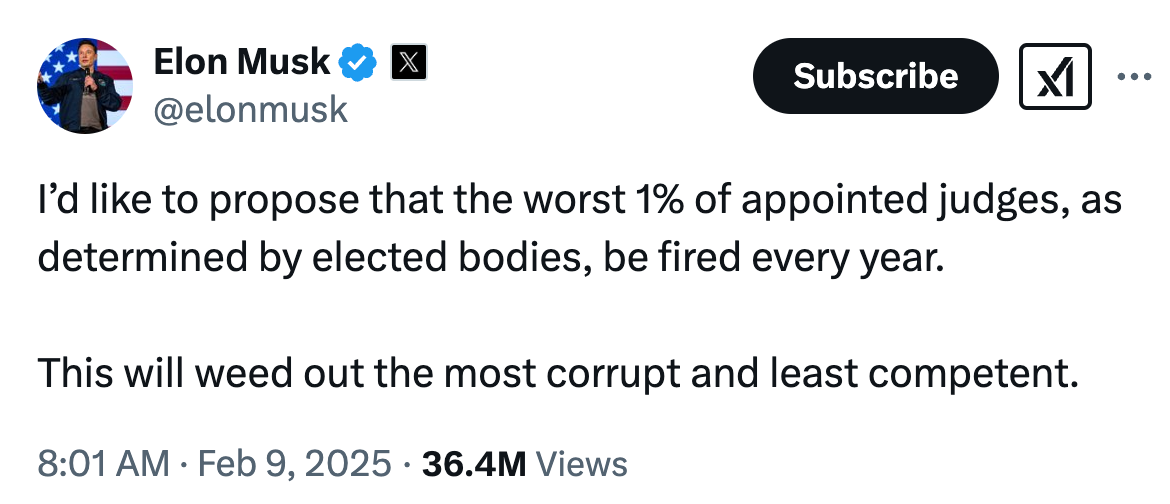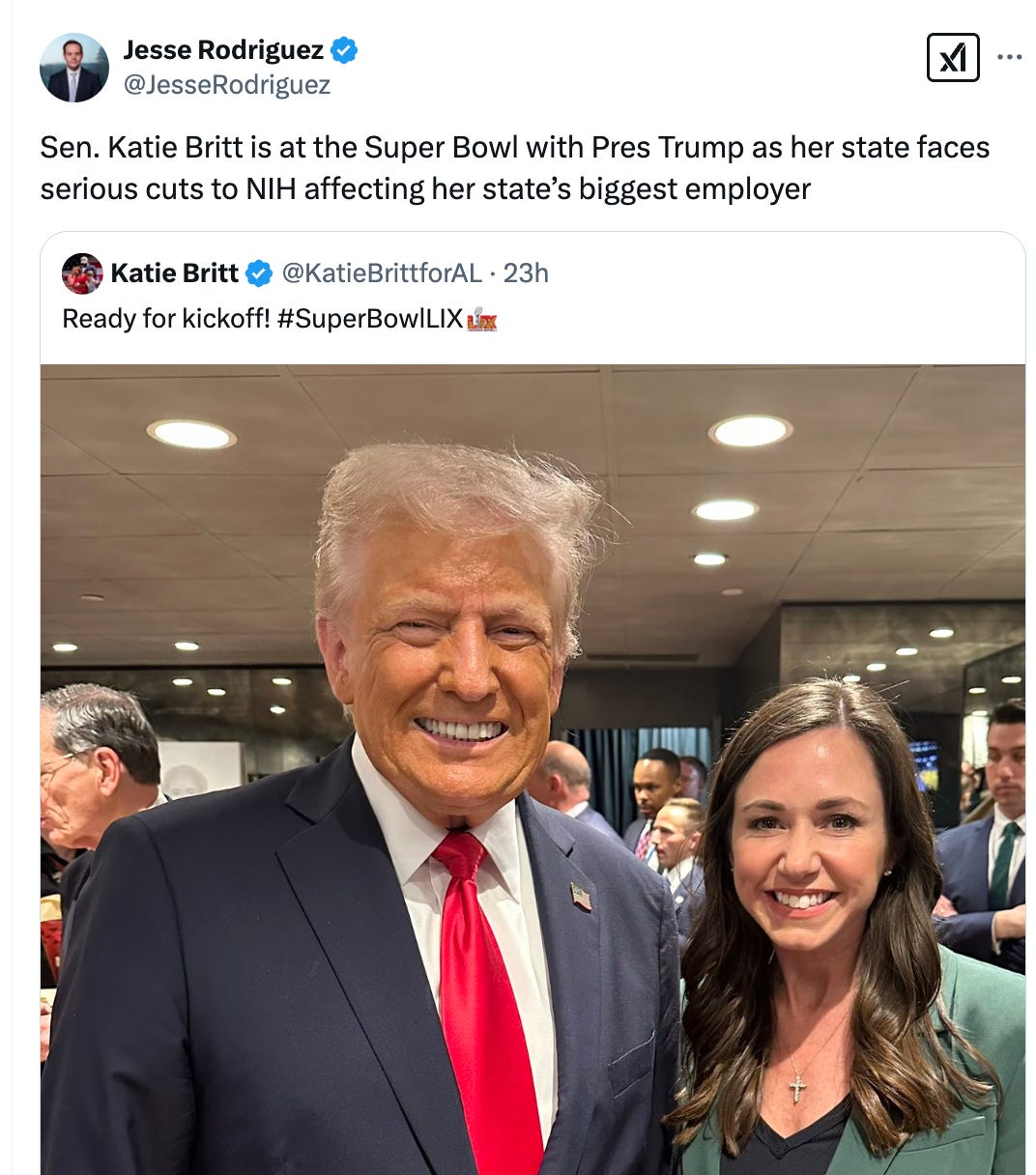At least one federal judge isn’t intimidated by Trump cronies attacking federal judges who have ruled against the new administration during its first three weeks of operation. Those attacks have taken the form of Elon Musk posting that 1% of the constitutionally life-tenured jurists should be fired every year and Texas Senator Mike Lee claiming a judge who entered a brief TRO had fomented a “judicial coup.” But a Judge in Rhode Island was not impressed.
U.S. District Court in Rhode Island: TRO on the Funding Freeze
Chief Judge John J. McConnell, an Obama appointee, is overseeing the case brought by a group of Democratic state attorney generals in Rhode Island. The case alleges Trump unlawfully interfered with Congress’ power of the purse by impounding spending. Judge McConnell found the plaintiffs had adequately demonstrated they would be irreparably harmed if Trump’s plan went into effect, and entered a temporary restraining order (TRO) that ordered the administration to end its improper freeze on federal funds and resume disbursing them until at least February 21, when the court will hold a hearing on the plaintiffs’ request for a preliminary injunction, a longer stay that would continue while the litigation moves forward.
The attorneys general had asked Judge McConnell to enforce his TRO against the administration, claiming they were continuing to withhold funding in violation of it. Judge McConnell agreed, starting his order with this:
“It is a basic proposition that all orders and judgments of courts must be complied with promptly. *** Persons who make private determinations of the law and refuse to obey an order generally risk criminal contempt even if the order is ultimately ruled incorrect. The orderly and expeditious administration of justice by the courts requires that an order issued by a court with jurisdiction over the subject matter and person must be obeyed by the parties until it is reversed by orderly and proper proceedings.”
The Judge told the government it was free to come back if it has evidence of a specific instance where it was necessary to withhold funds—the government had suggested it was doing all of this because of waste and fraud—but that the blanket freeze was “likely unconstitutional” and “has caused and continues to cause irreparable harm to a vast portion of this country.” In other words, his ruling was fair and reasonable. And unlike some suggestions over the weekend, judicial review is the way these controversies are worked through in our government. The president doesn’t get to just decide something is within his power to do, and that’s the end of it.
Even the Trump camp seems to have acknowledged that, filing an appeal of the TRO in the New York case where a judge ordered them late last week to keep DOGE out of Treasury systems until late this week when another judge will hold a preliminary injunction hearing. It is a modestly good sign that they chose the normal route of appealing an order they disagree with rather than flouting it.
U.S. District Court in Massachusetts: TRO on the Fork in the Road
On Monday, there was also a hearing in a Massachusetts federal court in AFL-CIO v. Ezell, a case involving Trump’s “fork in the road” email effort to force employees to leave government service with a coercive buyout offer that uses the promise of pay without work through September and the threat that layoffs may cause workers to lose their jobs if they don’t take advantage of the deal. The deal seemed sketchy, and the Union discouraged its members from taking it over concerns Trump couldn’t be trusted to uphold the bargain and pay employees.
Judge George O'Toole held following today’s hearing that the Trump administration can’t conduct the buyout plan, at least for now. He did not say when he expects to issue a decision. This unexpected “offer” was one of Trump’s first moves to consolidate power in his own hands by creating a tranche of vacancies in the supposed “deep state” that he could then fill with his own loyalists, justified as a reduction in government spending. You may recall Project 2025’s website has included, since at least late last summer, a form people interested in working for the Trump administration could use to apply and be vetted.
U.S. District Court in Massachusetts: TRO on NIH Research Payment Reductions
Another new lawsuit was filed today, this one challenging the Trump administration’s move to limit overhead that can be paid along with NIH research grants and that was widely viewed in the research community as a devastating blow to all sorts of essential work. On Monday, 22 states sued the Trump administration, alleging they were in violation of a 2017 law meant to prevent just such a move after Trump had tried something similar during his first term in office. You can read the full lawsuit here. The Judge entered a TRO this afternoon, temporarily blocking the administration from reducing health research grants.
It’s important to know just who the plaintiff states are because there’s a smart litigation strategy at work here—no freeloading. The only relief sought is for the states that have sued: Massachusetts, Michigan, Illinois, Arizona, California, Connecticut, Colorado, Delaware, Hawaii, Maine, Maryland, Minnesota, Nevada, New Jersey, New Mexico, New York, North Carolina, Oregon, Rhode Island, Vermont, Washington, and Wisconsin. Other states would still be subject to the Trump administration’s new policy. States like Alabama, where the University of Alabama at Birmingham has received more than a billion dollars in NIH funding in recent years. Vanderbilt University in Tennessee, which receives more than $400 million in funds is out of luck unless Senator Marsha Blackburn can talk Trump off the ledge on this one.
The complaint explains that, “The NIH is the primary source of federal funding for medical and public health research in the United States. In Fiscal Year 2023, NIH spent over $35 billion on almost 50,000 competitive grants to more than 300,000 researchers.” By limiting indirect costs that the federal government will cover, they are killing the research. The complaint continues, “Indirect costs are vital to conducting research that advances American stature in international technological advancement, medical research, and life-saving technologies. They support the fundamental expense of simply providing a location and staff to facilitate the research that would otherwise not be funded through direct costs … For example, a university which is funded to conduct cancer therapy research also must fund the physical maintenance of a laboratory and pay for the staff who manage the laboratory and lab equipment, such as operational staff who are not themselves researchers.” This may be Elon Musk’s idea of waste, but scientists, other researchers, and academics say their work will be gutted, with one researcher explaining, “Laboratories would literally go dark.” Just in time for the bird flu, or whatever the next national health emergency might be!
And more to come:
Minho Kim, writing for the New York Times, opened a piece on how Trump is permitting DOGE to get around open government rules like this: “In October, Elon Musk preached the message of government transparency during a presidential campaign rally he held in Pennsylvania … suggesting that nearly all government records should be made public. ‘There should be no need for FOIA requests,’ Mr. Musk reiterated on social media, referring to the law that gives the public the right to obtain copies of federal agency records: the Freedom of Information Act. ‘All government data should be default public for maximum transparency.’”
But now Trump has given DOGE a designation that means none of its documents, communications, or other materials can be made public until five years after Trump leaves office. Trump learned a thing or two about the levers of power during his first term in office. Even though he has to keep records, he is able to destroy them with the permission of the National Archivist. He just fired the incumbent in that position and will replace them with the nominee of his choice.
There is almost certain to be more litigation over this newest of Trump’s schemes to come to light. The list of cases filed during the new administration’s first month in operation is enormous by any standard. Trump is sure to label it the new witch hunt, and effort to interfere with his plans. Don’t be gaslit. This is a situation where there is fire lurking beneath the smoke. Judges have issued around ten TROs, and while they are preliminary stays that don’t decide the merits of the claims being raised, this magnitude of decisions against the government is unusual, suggesting, at a minimum, that the Trump administration is walking close to the line of unconstitutionality if not crossing over it.
We’re in this together,
Joyce






Well, I’m just waiting to see what happens when they don’t follow any of these orders since there’s really no way to enforce this stuff
I appreciate the push back from these judges. But will it matter? How is he held accountable for breaking these laws and defying these orders? Like when Mike Pence's life was at stake, won't he just say: "So what?" Serious question. Who will hold him accountable? We the people. But how?